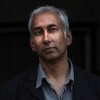Want to know what books Kenan Malik recommends on their reading list? We've researched interviews, social media posts, podcasts, and articles to build a comprehensive list of Kenan Malik's favorite book recommendations of all time.
1

In the wake of the Scientific Revolution, the late seventeenth and eighteenth centuries saw the complete demolition of traditional structures of authority, scientific thought, and belief by the new philosophy and the philosophers, including Voltaire, Diderot, and Rousseau. The Radical Enlightenment played a part in this revolutionary process, which effectively overthrew all justification for monarchy, aristocracy, and ecclesiastical power, as well as man's dominance over woman, theological dominance of education, and slavery. Despite the present day interest in the revolutions of the... more In the wake of the Scientific Revolution, the late seventeenth and eighteenth centuries saw the complete demolition of traditional structures of authority, scientific thought, and belief by the new philosophy and the philosophers, including Voltaire, Diderot, and Rousseau. The Radical Enlightenment played a part in this revolutionary process, which effectively overthrew all justification for monarchy, aristocracy, and ecclesiastical power, as well as man's dominance over woman, theological dominance of education, and slavery. Despite the present day interest in the revolutions of the eighteenth century, the origins and rise of the Radical Enlightenment have received limited scholarly attention. The greatest obstacle to the movement finding its proper place in modern historical writing is its international scope: the Radical Enlightenment was not French, British, German, Italian, Jewish or Dutch, but all of these at the same time.
In this wide-ranging volume, Jonathan Israel offers a novel interpretation of the Radical Enlightenment down to La Mettie and Diderot, two of its key exponents. Particular emphasis is placed on the pivotal role of Spinoza and the widespread underground international philosophical movement known before 1750 as Spinozism. less See more recommendations for this book...
2

Short fiction was an immensely innovative art in the medieval Arab world, providing the perfect vehicle for transmitting dazzling images of life and experiences as early as pre-Islamic times. These works also speak to the urbanization of the Arab domain after Islam, mirroring the bustling life of the Muslim Arabs and Islamized Persians and reflecting the sure stamp of an urbanity that had settled very staunchly after big conquests. All the noises and voices of the Umayyads and Abbasids are here. One can taste the flavor of Abbasid food, witness the rise of slave girls and singers, and... more Short fiction was an immensely innovative art in the medieval Arab world, providing the perfect vehicle for transmitting dazzling images of life and experiences as early as pre-Islamic times. These works also speak to the urbanization of the Arab domain after Islam, mirroring the bustling life of the Muslim Arabs and Islamized Persians and reflecting the sure stamp of an urbanity that had settled very staunchly after big conquests. All the noises and voices of the Umayyads and Abbasids are here. One can taste the flavor of Abbasid food, witness the rise of slave girls and singers, and experience the pride of state. Reading these texts today illuminates the wide spectrum of early Arab life and suggests the influences and innovations that flourished so vibrantly in medieval Arab society. The only resource of its kind, Salma Khadra Jayyusi's Classical Arabic Stories selects from an impressive corpus, including excerpts from seven seminal works: Ibn Tufail's novel, Hayy ibn Yaqzan; Kalila wa Dimna by Ibn al-Muqaffa; The Misers by al-Jahiz; The Brethren of Purity's The Protest of Animals Against Man; Al-Maqamat (The Assemblies) by al-Hamadhani and al-Hariri; Epistle of Forgiveness by al-Ma'arri; and the epic romance, Sayf Bin Dhi Yazan. Jayyusi organizes her anthology thematically, beginning with a presentation of pre-Islamic tales, stories of rulers and other notables, and thrilling narratives of danger and warfare. She follows with tales of love, religion, comedy, and the strange and the supernatural. Long assumed to be the lesser achievement when compared to Arabic literature's most celebrated genre-poetry-classical Arabic fiction, under Jayyusi's careful eye, finally receives a proper debut in English, demonstrating its unparalleled contribution to the evolution of medieval literature and its sophisticated representation of Arabic culture and life. less 
Kenan MalikIt’s almost impossible to get hold of this in English, but there is an edited extract in the anthology Classical Arab Stories. Few in the West will have heard of Abul Ala al-Ma’arri. Indeed, few in the Muslim world will know of him. Yet he is immensely important in the development of freethinking. Al-Ma’arri was one of the greatest poets in the Arab tradition and renowned for his unflinching... (Source)
See more recommendations for this book...
3

The second edition of Five Dialogues presents G. M. A. Grube's distinguished translations, as revised by John Cooper for Plato, Complete Works (Hacket, 1997). Cooper has also contributed a number of new or expanded footnotes and updated Suggestions for Further Reading. more The second edition of Five Dialogues presents G. M. A. Grube's distinguished translations, as revised by John Cooper for Plato, Complete Works (Hacket, 1997). Cooper has also contributed a number of new or expanded footnotes and updated Suggestions for Further Reading. less 
Kenan MalikUnlike earlier Greek philosophers, such as Diagoras and Democritus, Plato believed in the divine, and much of his philosophy flowed from his concept of a transcendental reality. He provided the resources for the later Christian view of goodness as a transcendental quality. But in his dialogue Euthyphro he also provides the classic argument against looking to God as the source of moral values, an... (Source)

Carlos FraenkelReading Plato can be a Socratic exercise because you’re reading a text that is part of the canon of philosophy but it advances views that are opposed to everything you believe in. (Source)

M M McCabeThe philosophical content creeps up on you when you think all this is merely a rhetorical flourish: it’s completely extraordinary. (Source)
See more recommendations for this book...
4

One of the most influential works of this century, this is a crucial exposition of existentialist thought. Influenced by works such as Don Juan, and the novels of Kafka, these essays begin with a meditation on suicide: the question of living or not living in an absurd universe devoid of order or meaning. With lyric eloquence, Camus posits a way out of despair, reaffirming the value of personal existence, and the possibility of life lived with dignity and authenticity. more One of the most influential works of this century, this is a crucial exposition of existentialist thought. Influenced by works such as Don Juan, and the novels of Kafka, these essays begin with a meditation on suicide: the question of living or not living in an absurd universe devoid of order or meaning. With lyric eloquence, Camus posits a way out of despair, reaffirming the value of personal existence, and the possibility of life lived with dignity and authenticity. less 
David Heinemeier HanssonCamus’ philosophical exposition of absurdity, suicide in the face of meaninglessness, and other cherry topics that continue on from his fictional work in novels like The Stranger. It’s surprisingly readable, unlike many other mid 20th century philosophers, yet no less deep or pointy. It’s a great follow-up, as an original text, to that book The Age of Absurdity, I recommended last year. Still... (Source)

Kenan MalikThe Myth of Sisyphus is a small work, but Camus’s meditation on faith and fate has personally been hugely important in developing my ideas. Writing in the embers of World War II, Camus confronts in The Myth of Sisyphus both the tragedy of recent history and what he sees as the absurdity of the human condition. There is, he observes, a chasm between the human need for meaning and what he calls... (Source)
See more recommendations for this book...
5

Fyodor Dostoevsky, Richard Pevear, Larissa Volokhonsky | 4.46
The Brothers Karamasov is a murder mystery, a courtroom drama, and an exploration of erotic rivalry in a series of triangular love affairs involving the “wicked and sentimental” Fyodor Pavlovich Karamazov and his three sons―the impulsive and sensual Dmitri; the coldly rational Ivan; and the healthy, red-cheeked young novice Alyosha. Through the gripping events of their story, Dostoevsky portrays the whole of Russian life, is social and spiritual striving, in what was both the golden age and a tragic turning point in Russian culture.
This award-winning translation by Richard Pevear... more The Brothers Karamasov is a murder mystery, a courtroom drama, and an exploration of erotic rivalry in a series of triangular love affairs involving the “wicked and sentimental” Fyodor Pavlovich Karamazov and his three sons―the impulsive and sensual Dmitri; the coldly rational Ivan; and the healthy, red-cheeked young novice Alyosha. Through the gripping events of their story, Dostoevsky portrays the whole of Russian life, is social and spiritual striving, in what was both the golden age and a tragic turning point in Russian culture.
This award-winning translation by Richard Pevear and Larissa Volokhonsky remains true to the verbal
inventiveness of Dostoevsky’s prose, preserving the multiple voices, the humor, and the surprising modernity of the original. It is an achievement worthy of Dostoevsky’s last and greatest novel. less 
Kenan MalikDostoevsky was a devout Christian and The Brothers Karamazov, his last and possibly greatest novel, was a heartfelt plea for the necessity of faith. The phrase If God does not exist, everything is permitted is often attributed to Dostoevsky. He actually never wrote that, but the sentiment certainly runs through much of his work, and most especially through The Brothers Karamazov. (Source)

Rachel KushnerThis book taught me something I knew on a much deeper level but did not have the language or the reasoning to state: that innocence is something very durable and interior, and also evanescent. (Source)
See more recommendations for this book...
Don't have time to read Kenan Malik's favorite books? Read Shortform summaries.
Shortform summaries help you learn 10x faster by:
- Being comprehensive: you learn the most important points in the book
- Cutting out the fluff: you focus your time on what's important to know
- Interactive exercises: apply the book's ideas to your own life with our educators' guidance.




